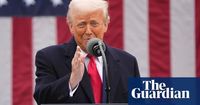In a move that could reshape the global automotive landscape, US President Donald Trump has imposed a sweeping 25 percent tariff on all vehicles imported into the United States, effective April 3, 2025. This tariff also extends to key automotive components such as engines, transmissions, and electronics, igniting concerns among industry analysts about potential chaos in the global auto market.
The Federal Chamber of Automotive Industries (FCAI), Australia's peak automotive body, has responded to this development, stating that the impact of these tariffs on Australian new car prices and the local automotive industry will be "limited." FCAI chief executive Tony Weber emphasized that Australia imports a relatively small proportion of its vehicles from the US, suggesting that the overall effect on Australian buyers will not be significant.
"Australia imports a relatively small proportion of its vehicles from the US, thus the total impact on Australian buyers is expected to be limited," Weber said in a statement following inquiries from Drive.
Despite the FCAI's reassurances, analysts predict that the tariffs will lead to substantial price hikes in the US, with new vehicle costs expected to rise by as much as $12,000 per vehicle, or approximately $19,200 AUD. Dan Ives, an analyst at financial services firm Wedbush, described the tariffs as "worse than the worst-case scenario" for the US economy, warning that the restructuring costs would ripple through the global automotive industry.
"It is becoming crystal clear this tariff US policy will cause pure chaos to the global auto industry," Ives told CNBC. He added that the implications extend beyond US consumers, as the tariffs will affect the operating costs and global bottom lines of car manufacturers worldwide.
The situation is complicated further by additional blanket tariffs announced on April 2, 2025, targeting car-making nations including South Korea, Japan, and China. China faces the highest new tariffs at 34 percent on all imports, compounding the already established 25 percent automotive tariff. South Korea and Japan will see tariffs of 25 percent and 24 percent, respectively, on top of the automotive tariffs.
The South Korean automotive industry, which exported nearly half of its 3.8 million vehicles manufactured in 2024, is expected to feel the strain, with exports valued at $34.74 billion, according to The Korea Herald. Meanwhile, Japan's automotive sector exports around 2.3 million cars annually to the US, worth approximately 6 trillion yen, or $68 billion AUD, as reported by the Australian Financial Review.
As these tariffs take effect, the economic ramifications for these countries could be severe. Japan's automotive industry, for instance, is projected to lose about 0.2 percent of its GDP, equating to around $13 billion AUD, due to the impact of the 25 percent tariff alone.
While Australia does not export cars to the US, it has a network of export businesses and suppliers that could be affected by the upheaval. Companies such as Victoria-based wheel manufacturer Carbon Revolution and South Australia-based manufacturer Redarc may see disruptions in their operations as global supply chains adjust.
In a related development, Australia has also been hit with a 10 percent tariff on all imports to the US as part of the broader global tariff regime. During his "liberation day" speech, Trump highlighted Australia's import ban on US beef, imposed in 2003 due to concerns over bovine spongiform encephalopathy, or mad cow disease. He criticized this ban while noting that Australia imported $3 billion worth of beef from the US in 2024.
Prime Minister Anthony Albanese has expressed strong opposition to the tariffs, calling them illogical and self-harming. He confirmed that Australia would not retaliate with reciprocal tariffs, stating, "We will not join a race to the bottom that leads to higher prices and slower growth. We will stand up for Australia." Albanese emphasized that Australia made strong representations to the US to dissuade the Trump administration from imposing tariffs, but these efforts were ultimately unsuccessful.
Opposition leader Peter Dutton echoed concerns about the treatment of Australia's relationship with the US under Trump. He stated that the tariffs do not respect the longstanding partnership between the two nations, although he did not specify how he would approach the situation differently if elected.
As the dust settles on these new tariffs, the automotive industry and global markets will be watching closely to see how manufacturers adapt to these changes. The FCAI has pledged to monitor the situation and assess how other nations respond to the US's decisions and their impact on the global automotive landscape.
In conclusion, while the immediate impact on Australian consumers may be limited, the broader implications of the US tariffs on the global automotive industry could lead to significant shifts in pricing, supply chains, and international trade relations. As the situation develops, stakeholders across the automotive sector will be keenly observing the unfolding dynamics.





